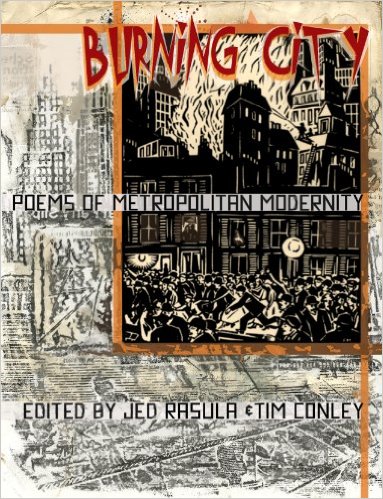
Burning City: Poems of Metropolitan Modernity
Jed Rasula and Tim Conley, Editors
Poetry. Anthology.
ISBN: 9780983148029
17 January 2012
$35
Burning City acts as a “multisensory Baedecker” to the many incarnations of international modernism from 1910-1939. Inspired by the abandoned plans of the early avant-garde poet Yvan Goll to write a history of modernity through the poetry of that era, scholars Jed Rasula and Tim Conley have carried out Goll’s project, scouring the small journals and magazines of the period for both lost and seminal texts. Burning City is organized not just according to the cities which inspired the texts—Paris, Cracow, Buenos Aires, and so on—but according to such icons of the modern urban experience as “Cineland,” “Music Hall,” “Electric Man.” Burning City makes a new contribution to anthologies of both poetry and modernism by its thematic focus on city life, by its inclusion of poets from languages and nationalities seldom represented in standard US surveys, and by its preservation of the typographic versatility of the this feverishly innovating period.
“…in Burning City Jed Rasula and Tim Conley have given us a historical anthology with clear implications for our present sense of what literary modernity might be and of how we could still be implicated in it.”
– Barry Schwabsky, Hyperallergic
“Rasula and Conley present an argument: the best way to grapple with the complex phenomenon of urban modernity in international poetry is to see it as a kind of music, exhibiting harmony at times and cacophony at others…”
– D.S. Lawson, The Volta
“Burning City: Poems of Metropolitan Modernity, a remarkable feat of research and editing by Jed Rasula and Tim Conley, contains more than 500 pages of mostly poetry from circa 1910 to 1940 that addresses rapidly changing urban environments and their accompanying technologies: radio, telephone, cinema, and so on. While the book’s introduction might describe this as “the heyday of the avant-gardes” and their radical artistic and literary experiments, it’s clear from reading the work in the anthology that its writers similarly felt experimented upon by their urban milieus.”
– Alan Gilbert , BOMB Magazine
“‘The fascination of cities,’ wrote Langston Hughes, ‘seizes me, burning like a fever in the blood.’ Burning City enacts that passion with astonishing skill and learning. Whatever else Modernism was or was not, its geography was that of the New Urbanism: from Paris and Berlin to São Paulo and Shanghai, from such icons as the Eiffel Tower and the Empire State Building to Moscow’s Nikitin Circus, it is the City in all its contradictions, its splendors and miseries, that was to become the laboratory of modernism, still dominating our dreams and nightmares a century after the fact. Truly global in its reach, yet local in its exacting particularities, Burning City breaks down the old familiar isms and genre divisions, introducing us to writings we’ve never seen before, printed side by side with our favorite poems by Huidobro and Musil, Mayakovsky and Mina Loy. In a nutshell, the map of modernism will never be the same!”
—Marjorie Perloff
ABOUT THE EDITORS
Jed Rasula is a Distinguished Professor at the University of Georgia Atlanta. He received his PhD from UC Santa Cruz in the History of Consciousness Program. Rasula edited the poetry magazine Wch Way (1976-84). From 1990-2000 he was on the editorial board of the journal Sulfur. His poetry titles include Tabula Rasula (1986) and Hot Wax, or Psyche’s Drip (2007), in addition to his anthology Imagining Language, co-edited with Steve McCaffery (1998).
Tim Conley is a professor of Modernist Literature, translation theories, and poetry at Brock University. His most recent works include the books Dance Moves of the Near Future (2015), and One False Move (2012). He has also edited and coedited several academic texts dealing with modernist writers such as James Joyce.